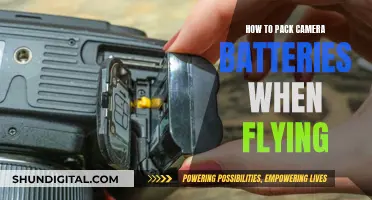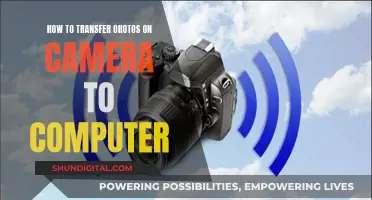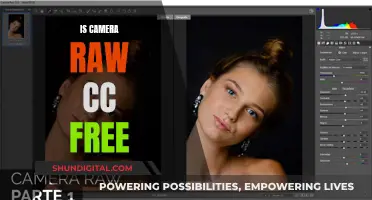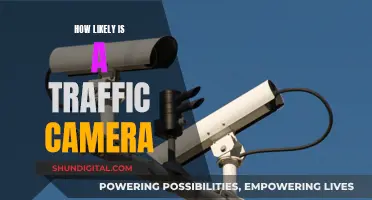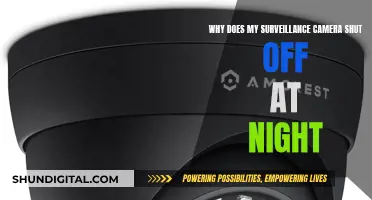
Traffic camera footage can be crucial in the event of a car accident, providing evidence to determine fault and resolve disputes and claims. In Colorado, there are several ways to obtain traffic camera footage. The state has hundreds of intersection cameras, red-light cameras, and highway cameras that capture car crashes and other incidents. To access footage, you can contact the relevant city or government entity, such as the Colorado Springs Police Department or the Colorado Department of Transportation, depending on the location and nature of the incident. Additionally, private companies like Traffic Cam Archive provide platforms where you can purchase and download traffic camera footage for specific locations and dates. These platforms can be useful for professionals in various industries, including law, insurance, and law enforcement, who require access to this type of footage for their work.
| Characteristics | Values |
|---|---|
| Traffic camera footage availability | Traffic camera footage is available from various sources, including traffic cameras at intersections, highways, and toll booths; security cameras near businesses; dashboard cameras; cellphones; and police footage. |
| Purpose of traffic cameras | To provide motorists with continuous information about traffic flow and incidents on highways and city streets. |
| Traffic camera footage usage | Traffic camera footage can be used as evidence for claims or lawsuits, helping to determine fault in car accidents and resolve disputes and claims. It is also useful for accident reconstruction, law enforcement investigations, and traffic research. |
| Obtaining traffic camera footage | To obtain traffic camera footage, contact the relevant city, police department, state agency, or business that owns or operates the camera. Submit a records request with specific information, such as location, timeframe, and direction. There may be a fee for obtaining the records. |
What You'll Learn

Colorado traffic camera footage for car accidents
If you have been injured in a car accident in Colorado, you may need evidence to prove that another driver was at fault. Video footage of the collision can be valuable evidence to support your claim or lawsuit. Depending on when and where your collision took place in Colorado, there are several options for obtaining video footage:
- Traffic camera footage: If your collision occurred at a busy intersection in Colorado Springs or another nearby city, there may be traffic cameras that captured the incident. The City of Colorado Springs provides an interactive map with camera icons that display snapshots of traffic flow and incidents.
- Highway video footage: Traffic cameras positioned on overpasses or near exit ramps on interstates may have captured your collision.
- Tollbooth video footage: If your collision occurred on a limited-access toll road in Colorado, such as I-70, there may be tollbooth video footage available.
- Security camera or CCTV footage: If your collision occurred near a business, they may have outdoor security cameras that captured the incident.
- Dashboard camera (dash cam) footage: Your vehicle, another car involved in the crash, or another vehicle driving by may have recorded the collision.
- Cellphone video footage: You or someone else who saw the collision may have recorded it on a cellphone.
- Police video footage: If a local police officer or state trooper from the Colorado State Police responded to your crash, they may have recorded video footage.
To obtain traffic camera footage in Colorado, you can follow these steps:
- Find the relevant camera: Use an interactive map to locate cameras in Colorado with the footage you need.
- Select the date: Choose the date of the incident to view the available videos for the selected camera.
- Preview and select the video: Watch the previews of the videos and select the one(s) you are interested in.
- Checkout and download: Complete the checkout process through a secure payment service, and your selected videos will be available to download within minutes.
It is important to act quickly to obtain video footage of your car accident, as there is no set time limit for how long such footage is saved. In some cases, businesses or individuals may destroy videos after only a few days. Consider consulting a lawyer to help you navigate the process and ensure you get the compensation you deserve.
Stabilizing Your Camera: Focus Rails and Tripods
You may want to see also

How to obtain footage from the City of Colorado Springs
If you're looking to obtain footage from the City of Colorado Springs, there are a few ways to go about it. The City of Colorado Springs operates a number of traffic cameras to provide motorists with continuous information about traffic flow and incidents. You can view a map of the camera locations and see snapshots, which are taken approximately every two to three minutes. This can be a useful way to get a sense of the traffic situation in real time.
However, if you're seeking footage for a specific purpose, such as evidence for a claim or lawsuit, you may need to make a formal request for the footage. The City of Colorado Springs or the Colorado Springs Police Department may be able to provide this, depending on the circumstances of your request. It's important to act quickly, as footage may only be retained for a limited time.
There are also private companies that capture and archive traffic camera footage in Colorado Springs. One such company, Traffic Cam Archive, allows users to purchase and download footage from a specific camera on a specific date. This can be a convenient way to obtain footage without going through the city or police department.
- Find the camera you need on their interactive map.
- Select the date of interest.
- Preview and select the videos you want, then add them to your cart.
- Checkout and make your payment.
- Your videos will be available to download within minutes.
Alternatively, if you are unable to find the footage you need through the above methods, you may want to consult a lawyer who can help you investigate and demand access to any relevant video evidence.
Xomodo Wireless Cameras: How Long Does the Charge Last?
You may want to see also

The Colorado Open Records Act
A "public record" includes most writings made, maintained, or kept by a government office. "Writings" include books, papers, maps, photographs, cards, tapes, recordings, and other documentary materials, as well as digitally stored data such as emails and text messages.
Who can request public records?
Anyone can request public records. Colorado does not have a residency requirement for requesting public records. You do not need to state a reason for seeking public records, but casting a wide net can be expensive.
You can request public records by sending a detailed, written request by mail or email to the relevant government office or custodian of the records. Each agency may have a different process for open records requests, so it is important to contact the appropriate office ahead of time to review its process.
Fees
There may be fees associated with requesting public records. For requests requiring a paper response, there is a charge of $0.25 per page after the first 25 pages or the actual cost of providing the materials, whichever is greater. If retrieving, reviewing, or preparing records consumes more than one hour of staff time, under state law, the agency may charge up to $41.37 per hour after the first hour of staff time.
Exemptions
It is important to note that not all records are subject to CORA. There are some exceptions, including medical, mental health, and scholastic records, as well as certain personnel files and trade secrets. Additionally, records that are specifically made not public by law are also exempt from CORA.
Ignoring Atlanta School Bus Camera Tickets: What's the Worst That Could Happen?
You may want to see also

Live traffic camera footage in Colorado
In addition to these free services, there are paid options for live traffic camera footage in Colorado. Traffic Cam Archive is a platform that captures, catalogues, and archives high-quality traffic camera footage. They currently have almost three million hours of footage available for Colorado, including videos from Denver, Colorado Springs, and rural areas. Their interactive map makes it easy to find and purchase the footage you need.
If you are looking for footage of a specific incident, such as a car accident, there are several options for obtaining live traffic camera footage in Colorado. Depending on the location and timing of the incident, you may be able to obtain footage from traffic cameras, highway cameras, tollbooth cameras, or security cameras. You can contact the relevant city or state department, such as the Colorado Department of Transportation for interstate or limited-access highway collisions, to request access to their camera footage. However, it is important to act quickly, as there is no set time limit for how long such footage is saved, and it may be destroyed after a few days.
For more immediate access, you can use a platform like Traffic Cam Archive to search for and purchase footage directly. This can be especially useful if you need footage for insurance or legal purposes, as it can provide valuable evidence to support your claim or lawsuit. With millions of hours of footage available, these platforms offer a convenient way to access live traffic camera footage in Colorado.
Car Park Security: Cameras and Surveillance
You may want to see also

Traffic camera footage for traffic research
Traffic camera footage can be an invaluable resource for traffic research, offering a wealth of information for researchers and professionals in the field. In Colorado, there are several ways to obtain traffic camera footage for research purposes. Here is a step-by-step guide:
Step 1: Identify Camera Locations
Use the interactive maps provided by the City of Colorado Springs and the Colorado Department of Transportation (CDOT) to identify traffic camera locations. The City of Colorado Springs provides a map with camera icons, displaying snapshots taken approximately every two to three minutes. The CDOT's map offers real-time traffic flow information with colour codes indicating traffic speeds.
Step 2: Determine the Type of Footage Needed
There are various types of traffic camera footage available in Colorado, depending on your specific research needs:
- Traffic camera footage: This includes cameras at busy intersections, especially in cities like Colorado Springs.
- Highway video footage: Traffic cameras are often positioned on overpasses or near exit ramps on interstates.
- Tollbooth video footage: This is particularly relevant for limited-access toll roads in Colorado, such as I-70.
- Security camera or CCTV footage: If your research focuses on a specific business or area with outdoor security cameras, this could be an option.
Step 3: Accessing the Footage
Obtaining traffic camera footage in Colorado typically involves contacting the relevant authority or organisation responsible for the cameras:
- City of Colorado Springs: If your research focuses on intersections monitored by traffic cameras in Colorado Springs, contact the City directly.
- Colorado Springs Police Department: For footage related to a specific incident or collision, contact the local police department.
- Colorado State Police: For state-related traffic matters, contact the State Police to access their camera footage.
- Colorado Department of Transportation (CDOT): The CDOT maintains records for interstates, U.S. and state roadways, and bridges. They provide an online system, OITS, for traffic-related statistics and information.
- Private Businesses: If your research requires footage from a security camera owned by a business, contact the business directly to inquire about accessing their CCTV footage.
Step 4: Submit a Records Request
To formally request access to traffic camera footage, you may need to submit a records request to the relevant authority. The Colorado Open Records Act (CORA) outlines the process for requesting public records. When submitting a request, provide specific information, including:
- Highway/roadway name
- Intersection and intersecting roadway names
- Timeframe of interest
- Direction of travel (e.g., eastbound)
- Any other pertinent details to locate the desired footage
There may be associated fees for obtaining records, especially if the request exceeds 25 pages or requires extensive staff time for retrieval.
Step 5: Alternative Sources
In addition to official sources, there are alternative ways to obtain traffic camera footage:
- Traffic Cam Archive: This platform captures, catalogues, and archives traffic camera footage from Denver, Colorado Springs, and other cities in Colorado. They offer an interactive map to locate cameras and purchase footage at a reasonable price.
- Dash Cam and Cellphone Footage: Depending on your research focus, dash cam footage from vehicles involved in incidents or cellphone videos recorded by bystanders could provide additional data.
By following these steps, you can effectively obtain traffic camera footage for traffic research in Colorado, utilising the wealth of information available from various sources.
Fight Camera Tickets: Know Your Rights, Texas!
You may want to see also
Frequently asked questions
You can obtain traffic camera footage in Colorado by submitting a request to the relevant authority. This could be the City of Colorado Springs, the Colorado Department of Transportation, or a private company such as Traffic Cam Archive.
When submitting a request for traffic camera footage in Colorado, you will typically need to provide specific information such as the date, time, and location of the incident. You may also need to provide a factual explanation for your request.
Obtaining traffic camera footage in Colorado may incur some costs. For example, the Colorado Department of Transportation charges a fee of $30 per hour for staff time if the request exceeds one hour. Private companies, such as Traffic Cam Archive, may also charge a fee for their services.
The time it takes to receive traffic camera footage in Colorado can vary depending on the authority you submit your request to. The Colorado Department of Transportation, for instance, is required by law to provide the requested documents within three working days.
Traffic camera footage can be used for various purposes, including determining liability in car accidents, traffic research, and law enforcement. It can be valuable evidence for insurance claims or legal proceedings related to accidents or incidents on the road.



